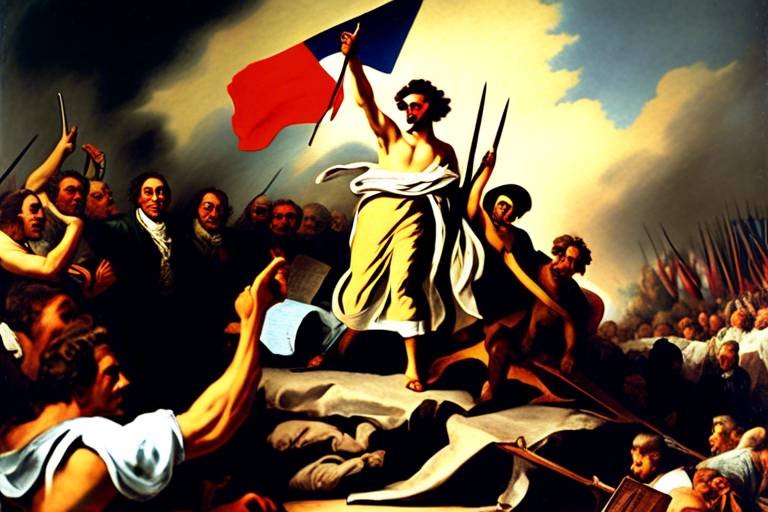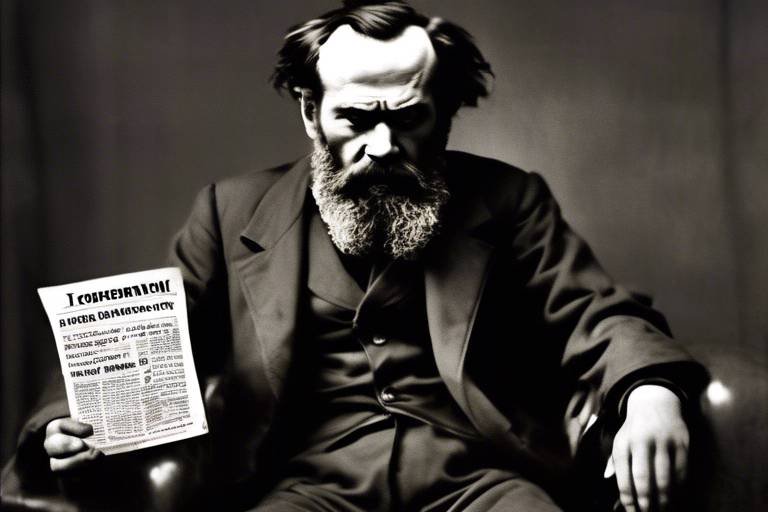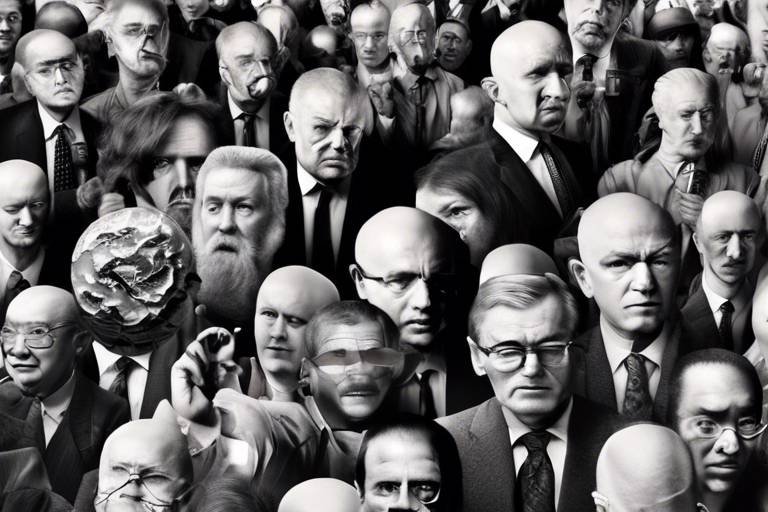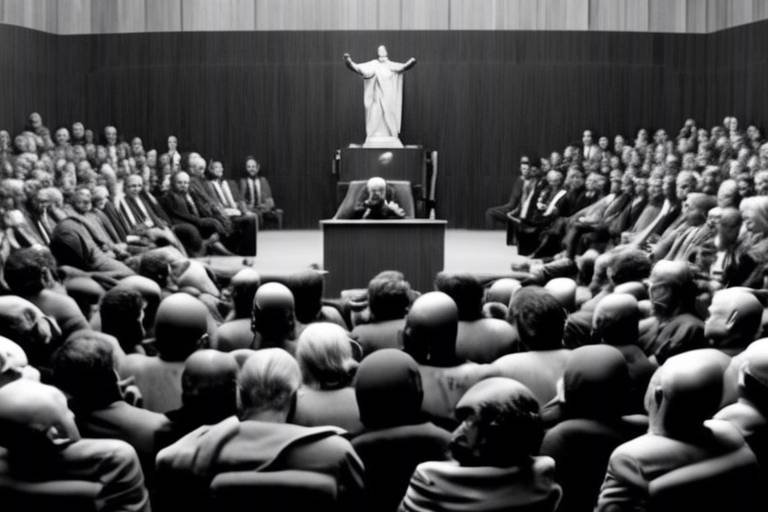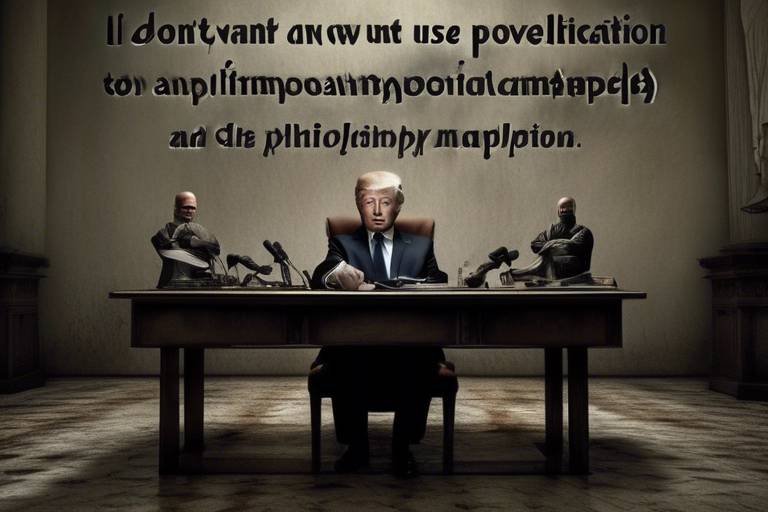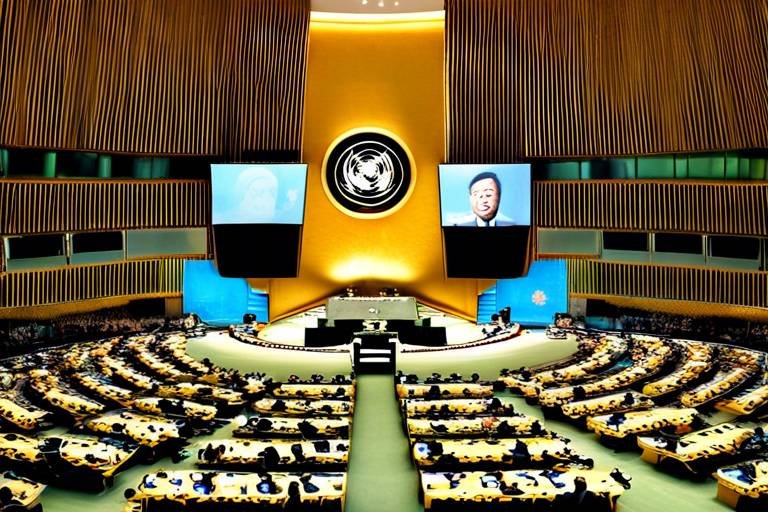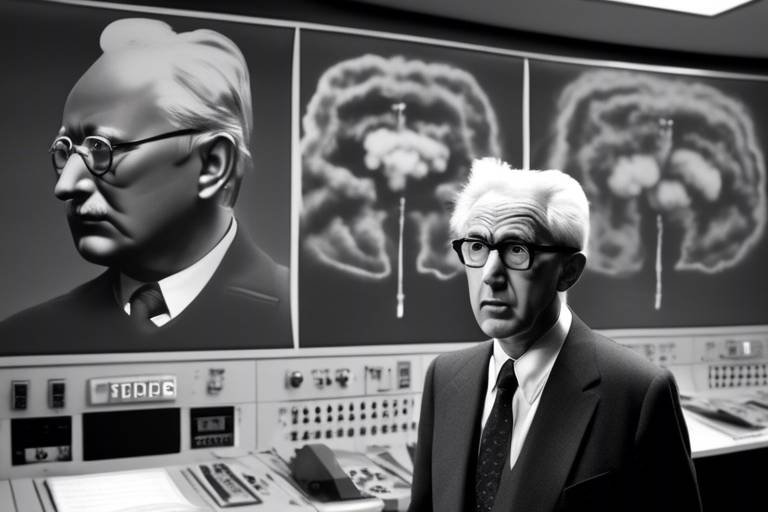Philosophy and Politics: Decoding Rationality
In our complex world, the interplay between philosophy and politics is not just a matter of academic interest; it profoundly impacts our daily lives. Imagine a landscape where decisions are made not just on whims but through a lens of rationality. This article explores how rationality shapes political thought and action, influencing governance and society in ways that can be both enlightening and perplexing. So, what exactly is rationality in the political realm, and why does it matter? Let’s dive deep into this intricate relationship.
Rationality, in philosophical terms, often refers to the ability to think logically and make decisions based on reasoned principles rather than emotions or biases. It’s like having a mental compass that guides us through the murky waters of political discourse. But what does this mean for human decision-making in politics? At its core, rationality is about making informed choices that ideally lead to the best outcomes for individuals and society as a whole. However, the definition of rationality can vary significantly across different philosophical schools of thought.
For instance, while some argue that rationality is synonymous with cold, calculated decisions, others believe it encompasses emotional intelligence and ethical considerations. This divergence raises a critical question: Can we truly separate emotion from rationality in political decision-making? The answer is likely no, as emotions often play a significant role in shaping our beliefs and choices, especially in the politically charged atmosphere we live in today.
Throughout history, philosophers have grappled with the concept of rationality and its implications for politics. From the idealistic visions of Plato to the pragmatic realism of Machiavelli, these thinkers have left an indelible mark on political theory. Their interpretations of rationality have shaped governance models and political practices across centuries.
Plato, the ancient Greek philosopher, envisioned a society governed by the philosopher-king, a ruler whose decisions are guided by wisdom and virtue. For Plato, rationality is central to this ideal state. He believed that only those who possess true knowledge and understanding should be entrusted with power. In his view, rationality is not just a tool for governance; it is the very foundation upon which a just society is built. This raises an intriguing point: can a society thrive when its leaders are not rational thinkers?
In stark contrast, Machiavelli took a more pragmatic approach to politics. His work, particularly "The Prince," reflects a world where rationality is applied in the pursuit of power, often at the expense of ethical considerations. Machiavelli argued that the ends justify the means, suggesting that rulers might need to act immorally to maintain stability and control. This perspective challenges us to consider: should political leaders prioritize rationality over ethics, or is a balance necessary for true governance?
Fast forward to contemporary political theories, and we find rationality woven into the fabric of democratic practices, liberalism, and social contract theories. The evolution of thought has led to a more nuanced understanding of how rationality operates within political systems.
One of the most significant contributions to modern political thought is the rational choice theory, which underpins liberalism. This theory posits that individuals make decisions based on a cost-benefit analysis, weighing their options to maximize personal gain. While this approach emphasizes individual decision-making, it also raises questions about the collective outcomes of such choices. Are we considering the greater good, or are we merely focused on our interests?
Critical rationalism further enriches political discourse by emphasizing the importance of criticism and debate. This approach advocates for an open dialogue where ideas can be challenged and refined, allowing for a more robust understanding of political ideologies and practices. In a world rife with misinformation and polarized opinions, critical rationalism offers a refreshing perspective that encourages us to question our beliefs and engage in constructive discussions.
While rationality is often viewed as the antithesis of emotion, the reality is much more complicated. Emotions play a crucial role in political decision-making, influencing how we perceive issues and react to political events. Think about it: how often do emotional appeals sway public opinion? Whether it's a passionate speech or a heart-wrenching story, emotions can drive rational thought in unexpected ways. This interplay between emotion and rationality complicates the notion of what it means to be a rational actor in politics.
Despite its importance, rationality faces numerous challenges in today's political landscape. Misinformation, cognitive biases, and the rise of populism threaten to undermine rational discourse. For instance, how do we navigate a world where facts are often overshadowed by sensationalism? The challenge lies in fostering an environment where rationality can thrive amid these obstacles, encouraging informed decision-making and critical thinking.
As we look to the future, the evolving concepts of rationality will undoubtedly shape the political landscape. Emerging trends suggest a growing recognition of the need for a balanced approach that integrates rationality with emotional intelligence and ethical considerations. The question remains: how will we adapt our political systems to reflect this understanding? Only time will tell, but one thing is certain: the journey of decoding rationality in politics is far from over.
- What is rationality in politics? Rationality in politics refers to the ability to make decisions based on logical reasoning, often aimed at achieving the best outcomes for society.
- How do historical philosophers view rationality? Historical philosophers like Plato and Machiavelli have interpreted rationality in various ways, influencing political theories and governance models.
- What role do emotions play in political rationality? Emotions significantly influence political decision-making, often shaping public opinion and the effectiveness of rational arguments.
- What are the challenges to rationality in politics today? Challenges include misinformation, cognitive biases, and populism, which can undermine rational discourse and informed decision-making.
- How might rationality evolve in future political landscapes? Future political landscapes may see a balanced integration of rationality, emotional intelligence, and ethical considerations, adapting to the needs of society.

The Nature of Rationality
When we dive into the concept of rationality, we’re not just swimming in shallow waters; we’re exploring the depths of human thought and decision-making. At its core, rationality refers to the ability to think logically, make decisions based on reason, and evaluate situations critically. It’s like having a mental compass that guides us through the murky waters of uncertainty and complexity in politics. But what does this really mean in the grand scheme of things?
In philosophical terms, rationality is often divided into two main categories: instrumental rationality and epistemic rationality. Instrumental rationality is about the means-ends relationship; it’s focused on choosing the best methods to achieve specific goals. Think of it as a toolkit where each tool is a strategy or method tailored for a particular task. On the other hand, epistemic rationality concerns itself with the pursuit of truth and knowledge. It’s about forming beliefs based on evidence and sound reasoning. In essence, it’s the foundation upon which we build our understanding of the world.
Now, how does this translate into the realm of politics? Rationality plays a pivotal role in shaping political ideologies and actions. Politicians, policymakers, and citizens alike rely on rational thought to navigate the complexities of governance. For instance, when a government proposes a new policy, it typically undergoes a rigorous process of analysis and debate. This is where rationality shines, as it helps to weigh the pros and cons, anticipate outcomes, and ultimately guide collective decision-making.
However, it’s crucial to acknowledge that rationality isn’t always a straightforward path. Human beings are not purely rational creatures; we are influenced by a myriad of factors, including emotions, biases, and social influences. This interplay can complicate our understanding of what it means to be rational in a political context. For example, a politician might make a decision that seems rational on paper, yet public sentiment—often driven by emotion—can sway that decision in unexpected ways.
Moreover, the implications of rationality extend beyond individual decision-making to encompass broader societal dynamics. The way we define and value rationality can shape our political systems and institutions. For instance, in democratic societies, rational discourse is often celebrated as a hallmark of good governance. Yet, when rationality is sidelined in favor of populist rhetoric or emotional appeals, the very fabric of democratic engagement can be threatened.
To better understand the multifaceted nature of rationality, we can consider the following key aspects:
- Decision-Making Process: How individuals and groups evaluate information and make choices.
- Influence of Emotions: The role emotions play in shaping rational thought and political behavior.
- Social Context: How societal norms and pressures can impact rational decision-making.
- Cognitive Biases: The mental shortcuts that can lead to irrational conclusions.
In summary, the nature of rationality is a complex and dynamic interplay of logic, emotion, and social influence. As we navigate the political landscape, understanding this intricate relationship can help us become more informed citizens and better decision-makers. Ultimately, rationality is not just a tool for political thought; it’s a lens through which we can examine the very essence of governance and society.

Historical Perspectives on Rationality in Politics
The interplay between rationality and politics has been a significant focus of philosophical inquiry throughout history. From the ancient Greeks to modern thinkers, the concept of rationality has evolved, shaping political theories and practices. Understanding these historical perspectives is crucial for grasping how rationality has influenced governance and societal structures. In ancient times, philosophers like Plato and Machiavelli presented contrasting views on rationality, each leaving a profound impact on political thought.
Plato, one of the earliest political philosophers, envisioned a society governed by the philosopher-king. In his ideal state, rationality was not just a tool but the very foundation of governance. According to Plato, true knowledge, derived from rational thought, was essential for making just decisions. He believed that only those who understood the essence of justice could govern effectively. This perspective emphasizes the role of rationality as a guiding force in creating a harmonious society.
In stark contrast, Machiavelli introduced a more pragmatic approach to politics. His seminal work, The Prince, is often viewed as a manual for political leaders seeking to maintain power. Machiavelli argued that rationality should be applied in the pursuit of power, often setting aside ethical considerations for the sake of political stability. He famously stated, "the ends justify the means," highlighting a more utilitarian view of rationality that prioritizes results over ideals. This shift marked a significant departure from Plato's idealism, suggesting that rationality could be manipulated to serve self-interest and political survival.
Throughout history, these foundational ideas have continued to influence political thought. Philosophers such as Thomas Hobbes and John Locke built upon these concepts, introducing their interpretations of rationality in the context of social contracts and governance. Hobbes viewed humans as inherently self-interested, advocating for a strong central authority to maintain order. In contrast, Locke emphasized individual rights and rational consent as the basis for legitimate government. This divergence illustrates how different interpretations of rationality can lead to varied political ideologies.
As we move into modern political theory, the legacy of these historical perspectives remains evident. Rationality continues to be a crucial element in discussions about democracy, governance, and the role of the state. It is fascinating to see how the debates initiated by these early philosophers still resonate today, influencing contemporary political discourse and shaping the frameworks within which we analyze political behavior.
In summary, the historical perspectives on rationality in politics reveal a rich tapestry of thought that has evolved over centuries. From Plato's idealism to Machiavelli's realism, the understanding of rationality has profoundly shaped political theory and practice. As we continue to explore the implications of rationality in contemporary governance, it is essential to reflect on these historical foundations and their relevance in today's political landscape.
- What is the significance of rationality in political theory?
Rationality is significant in political theory as it helps shape decision-making processes, governance structures, and the ethical considerations that guide political actions. - How did Plato and Machiavelli differ in their views on rationality?
Plato viewed rationality as essential for achieving justice and governance by wisdom, while Machiavelli saw it as a means to acquire and maintain power, often disregarding ethical implications. - What contemporary political theories are influenced by historical perspectives on rationality?
Contemporary theories such as liberalism, social contract theory, and critical rationalism have all been influenced by historical views on rationality, adapting them to modern contexts.

Plato's Idealism
When we dive into the philosophical waters of Plato's thought, we encounter a vision of governance that is both profound and, dare I say, idealistic. Plato, often hailed as the father of Western philosophy, believed that rationality should be the cornerstone of any political system. His concept of the philosopher-king is perhaps the most striking illustration of this belief. Imagine a ruler who is not only wise but also deeply virtuous—someone who governs not for personal gain but for the betterment of society. This ideal ruler embodies the principles of rational thought, making decisions based on knowledge and the pursuit of the common good.
In Plato's view, the ideal state is one where reason prevails over passion. He argued that the masses, driven by emotions and desires, often make choices that are detrimental to their own welfare. To combat this, Plato proposed a ruling class of philosopher-kings who possess the wisdom and rationality necessary to guide the populace. This is not just a fanciful notion; it’s a call for a governance model rooted in knowledge and virtue, where leaders understand the forms of justice, beauty, and the good.
Plato's idealism can be broken down into several key components:
- Knowledge as Power: For Plato, knowledge is the highest form of understanding, and those who possess it are best suited to rule.
- The Allegory of the Cave: This famous allegory illustrates how most people live in ignorance, mistaking shadows for reality, and how the philosopher must ascend to the light of truth.
- Justice in the State: He believed that a just society mirrors the just individual, where each class performs its role harmoniously.
But what does this mean for contemporary politics? Plato's ideas challenge us to consider the qualifications and moral integrity of our leaders. Are they truly wise? Do they act in the best interest of society? In an age where populism often sways the masses, Plato’s insistence on rationality and virtue seems more relevant than ever. His vision serves as a reminder that while emotions are a natural part of human decision-making, they should not overshadow the importance of reasoned thought in governance.
In conclusion, Plato's idealism invites us to reflect on the nature of leadership and the qualities we should seek in those who govern. It poses a critical question: can we cultivate a political landscape where rationality triumphs over emotional impulses? As we navigate the complexities of modern governance, Plato’s insights remain a guiding light, urging us to strive for a society led by those who are not just powerful, but profoundly wise.
- What is the philosopher-king concept? The philosopher-king is a ruler who possesses both wisdom and virtue, governing for the benefit of society rather than personal gain.
- How does Plato's idealism relate to modern politics? Plato's emphasis on rationality and virtue in leadership challenges contemporary political practices, especially in the context of populism.
- What is the Allegory of the Cave? This allegory illustrates the difference between the world of appearances and the world of reality, emphasizing the importance of education and enlightenment.

Machiavelli's Realism
When we dive into the world of , we're stepping into a realm where politics is not just about lofty ideals, but rather a gritty, pragmatic approach to governance. Niccolò Machiavelli, often seen as the father of modern political science, challenged the notion that morality and politics must go hand-in-hand. Instead, he proposed a starkly different perspective: that the ends often justify the means. This idea can be both shocking and enlightening, as it forces us to reconsider how we view political leaders and their decisions.
Machiavelli's seminal work, The Prince, serves as a guide for rulers on how to maintain power and navigate the turbulent waters of political life. One of the core tenets of his philosophy is that a successful ruler must be willing to act immorally when necessary. This doesn't mean that he encourages tyranny or cruelty for its own sake; rather, he argues that a leader's primary responsibility is to the stability and security of the state. In this context, rationality plays a crucial role, as it allows leaders to evaluate situations coldly and make decisions that may not align with conventional ethics but are deemed necessary for the greater good.
To illustrate Machiavelli's pragmatic approach, consider the following key points:
- Power Dynamics: Machiavelli emphasizes the importance of understanding power relations. A ruler must be astute in reading the political landscape and adjusting strategies accordingly.
- Realism Over Idealism: Unlike Plato, who envisioned a utopian society led by philosopher-kings, Machiavelli accepts the chaotic nature of human behavior and the political arena.
- Flexibility in Governance: A successful leader must adapt to changing circumstances, showing a willingness to employ both virtuous and ruthless tactics as the situation demands.
Moreover, Machiavelli's realism has profound implications for how we interpret modern politics. In an age where populism and partisanship often cloud rational discourse, the lessons from Machiavelli remind us that political decisions are rarely black and white. Instead, they exist in a gray area where leaders must constantly balance ethical considerations with the practicalities of governance. This perspective can sometimes lead to a disillusionment with political figures, as we may find ourselves questioning their motives and the authenticity of their promises.
Ultimately, Machiavelli's realism invites us to confront uncomfortable truths about power and governance. It challenges us to recognize that while rationality is a guiding force, it is often intertwined with the complexities of human emotion, ambition, and fear. As we navigate our own political landscapes, understanding Machiavelli's insights can empower us to critically analyze the actions of our leaders and the systems that govern our lives.
What is Machiavelli's main argument in The Prince?
Machiavelli argues that political leaders should prioritize the stability and security of the state over traditional moral values. He believes that sometimes immoral actions are necessary to maintain power and governance.
How does Machiavelli's realism differ from Plato's idealism?
While Plato advocates for a utopian society governed by philosopher-kings who embody virtue and wisdom, Machiavelli acknowledges the chaotic nature of human behavior and the necessity of pragmatic, sometimes ruthless, decision-making in politics.
Can Machiavelli's ideas be applied to modern politics?
Yes, Machiavelli's insights into power dynamics, the importance of adaptability, and the complexities of human nature remain relevant in analyzing contemporary political strategies and the behavior of leaders.

Modern Political Theories and Rationality
When we dive into the realm of modern political theories, it becomes clear that rationality is not just a buzzword; it's a cornerstone that shapes our understanding of governance and societal dynamics. In the 20th and 21st centuries, thinkers have expanded upon the foundations laid by their predecessors, integrating rationality into various frameworks that define how we perceive democracy, liberalism, and social contracts.
At the heart of these theories lies the concept of rational choice theory. This theory posits that individuals are rational actors who make decisions by weighing costs and benefits to maximize their utility. This approach has been particularly influential in liberal thought, where the notion of individual freedom and choice is paramount. Imagine a marketplace where every decision—be it buying a loaf of bread or voting in an election—is driven by a calculated assessment of personal gain. This analogy encapsulates how rational choice theory operates within the political landscape.
In liberal democracies, rationality is often seen as a guiding principle that promotes effective governance. Political leaders are expected to make decisions based on empirical evidence and logical reasoning, striving for policies that reflect the collective will of the people. However, this ideal is frequently challenged by the complexities of human behavior. People are not always the rational actors that theories suggest; emotions, biases, and social influences often cloud judgment, leading to decisions that may not align with pure rationality.
Another significant contribution to modern political discourse is critical rationalism. This approach emphasizes the importance of criticism and debate in refining political ideologies. Unlike traditional rationalism, which often seeks to establish absolute truths, critical rationalism encourages an ongoing dialogue where ideas are constantly tested and improved. It recognizes that in politics, as in life, certainty is a rare commodity, and the ability to adapt and respond to criticism is vital for the evolution of sound governance.
Moreover, the interplay between rationality and emotion cannot be overlooked. While rationality aims for objective decision-making, emotions often play a crucial role in shaping political opinions and actions. For instance, consider how political campaigns frequently leverage emotional appeals to connect with voters. A candidate might share a personal story that resonates with the audience, prompting an emotional response that can override rational assessments of their policies. This phenomenon highlights the complexity of political rationality, where logic and emotion coexist, sometimes in tension with one another.
In summary, modern political theories intricately weave rationality into their frameworks, yet they also acknowledge the limitations and challenges that arise from human behavior. As we continue to navigate the complexities of governance in an ever-evolving world, understanding the role of rationality will be essential for both political leaders and citizens alike. The dialogue between rationality and emotion, individual choice and collective good, remains a dynamic aspect of our political landscape.
- What is rational choice theory?
Rational choice theory suggests that individuals make decisions based on a calculated assessment of costs and benefits to maximize their personal utility. - How does critical rationalism differ from traditional rationalism?
Critical rationalism emphasizes the importance of criticism and debate in refining political ideologies, whereas traditional rationalism seeks to establish absolute truths. - Why is the interplay between emotion and rationality significant in politics?
Emotions can heavily influence political opinions and decisions, often overriding purely rational assessments, making it crucial to understand their role in the political process.

Liberalism and Rational Choice Theory
Liberalism, as a political philosophy, is deeply intertwined with the concept of rational choice theory. This theory posits that individuals make decisions based on a rational evaluation of the costs and benefits associated with various options. In the context of liberal thought, this means that individuals are seen as autonomous agents who seek to maximize their utility. The beauty of this framework lies in its simplicity: it assumes that people are inherently rational and will act in their best interests when making political choices.
But how does this rational choice theory manifest in the political arena? Well, it’s all about the way individuals engage with democratic processes. Voters, for instance, weigh their options carefully before casting their ballots. They consider factors like party platforms, candidate qualifications, and the potential impact of policies on their lives. This is where rationality comes into play, as individuals assess which option aligns best with their preferences and values.
Moreover, rational choice theory offers a lens through which we can understand collective political outcomes. When enough individuals follow this rational decision-making process, we start to see patterns emerge in voting behavior and public policy. For example, if a significant number of voters prioritize economic stability, political parties may shift their platforms to address these concerns. This dynamic creates a feedback loop where rational individual choices shape broader political landscapes.
However, it’s essential to recognize that rational choice theory is not without its critics. Some argue that it oversimplifies complex human behavior and overlooks the emotional and social factors that influence decision-making. For instance, consider how a voter might support a candidate not just based on rational evaluation but also due to emotional appeals, such as charisma or shared values. This interplay between emotion and rationality adds layers of complexity to the political decision-making process.
To illustrate the relationship between liberalism and rational choice theory, let’s take a look at a simple table summarizing their key aspects:
| Aspect | Liberalism | Rational Choice Theory |
|---|---|---|
| Core Belief | Individual freedom and autonomy | Individuals act to maximize their utility |
| Decision-Making | Influenced by rights and liberties | Cost-benefit analysis |
| Political Engagement | Participation in democratic processes | Rational evaluation of choices |
| Criticism | Overemphasis on individualism | Neglect of emotional and social factors |
In conclusion, the integration of rational choice theory into liberalism provides a framework for understanding how individuals navigate the political landscape. While it offers valuable insights, it’s crucial to remain aware of its limitations and the multifaceted nature of human decision-making. As we continue to explore the intersections of rationality and politics, we must embrace both the rational calculations and the emotional currents that drive political behavior.
- What is the main premise of rational choice theory? Rational choice theory suggests that individuals make decisions by weighing the costs and benefits to maximize their personal utility.
- How does liberalism relate to rational choice theory? Liberalism emphasizes individual freedom and autonomy, which aligns with the idea that individuals act rationally in their own best interests.
- What are some criticisms of rational choice theory? Critics argue that it oversimplifies human behavior and neglects the emotional and social influences on decision-making.
- Can emotions influence political decisions? Yes, emotions can significantly impact political choices, often complementing or even overshadowing rational evaluations.

Critical Rationalism
Critical rationalism, a term popularized by philosopher Karl Popper, represents a significant shift in how we perceive the interplay between rationality and political discourse. At its core, critical rationalism posits that knowledge progresses through a process of conjectures and refutations, rather than through a linear accumulation of truths. This approach is particularly relevant in the realm of politics, where ideologies often clash and the stakes are incredibly high.
One of the most compelling aspects of critical rationalism is its emphasis on criticism as a means of refining political thought. In a world where political ideologies can often become dogmatic, critical rationalism encourages an environment where ideas are constantly scrutinized and debated. This is essential for a healthy democracy, where the ability to challenge prevailing notions can lead to more robust and adaptable governance. The process of questioning and revising ideas acts as a safeguard against the stagnation of political thought.
Moreover, critical rationalism highlights the importance of fallibility. It acknowledges that no political theory or practice is infallible, which is a refreshing perspective in an era where many leaders and ideologies claim absolute certainty. This recognition of human error allows for a more nuanced understanding of political action and decision-making. Instead of rigidly adhering to a particular ideology, policymakers and citizens alike can engage in a more fluid and dynamic discourse, adapting to new information and perspectives as they arise.
To illustrate the practical implications of critical rationalism in politics, consider the following key principles:
- Open Debate: Encouraging open discussions where all viewpoints can be expressed fosters a culture of critical engagement.
- Empirical Testing: Policies should be tested against real-world outcomes, and if they fail, they should be revised or discarded.
- Continuous Learning: Political actors must remain open to learning from past mistakes, ensuring that governance evolves with changing societal needs.
In summary, critical rationalism offers a framework through which we can better understand the complexities of political rationality. By prioritizing criticism, recognizing fallibility, and fostering open debate, we create a political landscape that is not only more resilient but also more responsive to the needs of society. This approach not only enriches our political discourse but also empowers citizens to engage meaningfully with the issues that affect their lives.
- What is critical rationalism? Critical rationalism is a philosophical approach that emphasizes the importance of criticism and the fallibility of knowledge, particularly in the context of political discourse.
- How does critical rationalism apply to politics? It encourages open debate, empirical testing of policies, and continuous learning from past mistakes, fostering a more dynamic political environment.
- Who is Karl Popper? Karl Popper was a philosopher known for his contributions to the philosophy of science and political theory, particularly through his advocacy for critical rationalism.

The Role of Emotion in Political Rationality
When we think of politics, we often picture cold, hard facts and figures, where decisions are made based on logical reasoning and rationality. However, the truth is that emotion plays a significant role in shaping political rationality. It’s like trying to navigate a ship without acknowledging the winds and currents; emotions are those very forces that guide and sometimes mislead our political journey.
At its core, political rationality involves making decisions that are logical and beneficial for the collective. But what happens when emotions come into play? Emotions can act as a double-edged sword; they can motivate individuals to participate in the political process, but they can also cloud judgment and lead to irrational outcomes. For instance, during elections, candidates often tap into the electorate's emotions—be it fear, hope, or anger—to sway public opinion. This emotional appeal can sometimes override rational analysis, leading voters to make decisions based on feelings rather than facts.
Consider the following scenarios where emotion heavily influences political rationality:
- Fear-based Appeals: Political campaigns often use fear to mobilize voters. A candidate might emphasize the dangers of a particular policy or the threat posed by an opponent. This can lead to a heightened emotional response, which may prompt voters to support policies that they might not endorse under more rational circumstances.
- Hope and Optimism: Conversely, candidates who inspire hope can galvanize support. Think of Barack Obama’s “Yes We Can” campaign, which leveraged optimism to rally a diverse coalition of voters. Here, positive emotions can lead to increased political engagement and participation.
- Anger and Outrage: Social media has amplified the role of anger in politics. Viral posts that evoke outrage can spread rapidly, influencing public sentiment and driving political action. This can create a volatile political environment where decisions are made in haste, often without thorough consideration.
Moreover, the interplay between emotion and rationality is not just limited to voters; it extends to politicians and policymakers as well. Leaders often have to balance their emotional responses with rational decision-making. For instance, during a crisis, a leader’s emotional intelligence can be crucial in addressing public concerns while also formulating effective policies. A calm, rational response can help to stabilize a situation, while an emotionally charged reaction can exacerbate tensions.
In this context, it’s essential to recognize that while emotion can enhance political engagement, it can also lead to detrimental outcomes. Cognitive biases, such as confirmation bias, can lead individuals to favor information that aligns with their emotional responses, further entrenching divisions within society. This highlights the importance of fostering a political culture that encourages critical thinking and open dialogue, allowing rationality to coexist with emotional expression.
Ultimately, understanding the role of emotion in political rationality is crucial for both voters and leaders. It’s about finding that delicate balance—acknowledging the power of emotions while striving for informed, rational decision-making. This balance can pave the way for a more engaged and thoughtful political discourse, one that respects the emotional landscape while also championing reasoned debate.
- What is the relationship between emotion and rationality in politics?
Emotion and rationality often intersect in politics, influencing decision-making and public opinion. While emotions can motivate political engagement, they can also lead to irrational choices. - How do political campaigns use emotions?
Campaigns frequently leverage emotions such as fear, hope, and anger to sway voters, often prioritizing emotional appeal over rational arguments. - Can emotions enhance political participation?
Yes, positive emotions like hope can inspire greater political participation and engagement among voters. - What are cognitive biases?
Cognitive biases are mental shortcuts that can lead to flawed decision-making. In politics, they may cause individuals to favor information that aligns with their existing emotional beliefs.

Challenges to Rationality in Politics
Rationality in politics is often viewed as the gold standard for decision-making and governance. However, the reality is much more complex. In an age where information is abundant yet often misleading, the challenges to rationality are myriad and profound. One of the most significant hurdles is the phenomenon of misinformation. This can take many forms, from outright lies to biased interpretations of facts, and it can skew public perception and policy decisions. When citizens are bombarded with conflicting information, how can they make rational choices? The answer is that they often can't, leading to decisions driven more by emotion or groupthink than by logical reasoning.
Moreover, the rise of populism has further complicated the landscape of political rationality. Populist leaders often appeal to the emotions and fears of the populace, prioritizing charismatic rhetoric over rational discourse. This can create a political environment where emotional appeals overshadow factual analysis, leading to policies that resonate on a visceral level but may lack logical foundation. It's like a rollercoaster ride—thrilling and engaging, but not necessarily safe or sensible.
Cognitive biases also play a crucial role in undermining rationality in political contexts. These mental shortcuts can lead individuals to make decisions based on preconceived notions or emotional reactions rather than objective analysis. For example, the confirmation bias causes people to seek out information that supports their existing beliefs while ignoring evidence that contradicts them. This can create echo chambers, where rational debate is stifled and polarization deepens, making it increasingly difficult for rational discourse to prevail.
To better illustrate these challenges, consider the following table that outlines some common factors that impede rationality in politics:
| Challenge | Description |
|---|---|
| Misinformation | False or misleading information that distorts public understanding and decision-making. |
| Populism | Political movements that prioritize emotional appeal over rational discourse, often leading to simplified solutions for complex issues. |
| Cognitive Biases | Mental shortcuts that can lead to flawed reasoning and decision-making, such as confirmation bias and availability heuristic. |
In addition, the rapid advancement of technology has introduced another layer of complexity. The rise of social media platforms has transformed the way information is disseminated and consumed. While these platforms can foster dialogue, they can also facilitate the rapid spread of misinformation and sensationalism. This creates a challenge for rationality, as users may be more likely to engage with emotionally charged content rather than critically analyze the information presented to them.
Ultimately, the challenges to rationality in politics are not just theoretical; they have real-world implications for governance and societal well-being. As citizens, policymakers, and scholars grapple with these issues, it's crucial to foster environments where critical thinking and rational discourse can thrive. This may involve promoting media literacy, encouraging open dialogue, and creating spaces where diverse viewpoints can be explored without devolving into emotional conflict.
- What is the impact of misinformation on political rationality? Misinformation can distort public understanding, leading to decisions based on false premises rather than factual analysis.
- How does populism affect rational discourse? Populism often prioritizes emotional appeal over rational debate, creating an environment where logical reasoning is overshadowed by charismatic rhetoric.
- What are cognitive biases, and how do they influence political decisions? Cognitive biases are mental shortcuts that can lead to flawed reasoning, causing individuals to make decisions based on preconceived beliefs rather than objective analysis.

Future Directions: Rationality in Politics
As we look towards the future, the concept of rationality in politics is evolving at an unprecedented pace. The intersection of technology, social media, and global interconnectedness is reshaping how we understand and apply rational thought in political discourse. In this age of information overload, the challenge is not just to be rational but to discern what constitutes rationality amidst a sea of conflicting narratives.
One of the most significant trends is the rise of data-driven decision-making. Politicians and policymakers increasingly rely on data analytics to guide their strategies and policies. This reliance on quantitative data can enhance rationality by providing a clearer picture of public sentiment and needs. However, it also raises concerns about the potential for manipulation and the oversimplification of complex human behaviors into mere numbers. As we move forward, it will be crucial to balance data with qualitative insights to ensure a holistic understanding of political realities.
Moreover, the growing influence of artificial intelligence (AI) in political decision-making is another area to watch. AI tools can analyze vast amounts of data and predict outcomes, potentially leading to more rational and informed decisions. However, the ethical implications of using AI in politics cannot be ignored. Questions arise about accountability, transparency, and the potential for bias in algorithms. As we embrace technology, we must also ensure that it serves democratic values and enhances rational discourse rather than undermining it.
Additionally, the role of emotional intelligence in political rationality is gaining recognition. While traditional views often prioritize cold, hard logic, there is a growing understanding that emotions play a critical role in human decision-making. Politicians who can connect with their constituents on an emotional level may find greater success in persuading and mobilizing public support. Thus, the future of rationality in politics might not only rely on logical arguments but also on the ability to resonate emotionally with the electorate.
As we navigate these changes, fostering a culture of critical thinking and open dialogue will be essential. Encouraging citizens to engage in rational debate and question prevailing narratives can help combat the rise of misinformation and populism. Educational systems must adapt to equip future generations with the skills necessary for discerning fact from fiction, ultimately promoting a more informed and rational electorate.
In conclusion, the future directions of rationality in politics are multifaceted and complex. By embracing data, leveraging technology, recognizing the importance of emotional intelligence, and fostering critical thinking, we can hope to cultivate a political landscape that values rational discourse. As we step into this new era, let us remember that rationality is not just about logic; it's about understanding the human experience and making decisions that reflect our shared values and aspirations.
- What is the role of rationality in politics? Rationality in politics helps guide decision-making processes, ensuring that policies are based on logical reasoning and empirical evidence rather than emotions or biases.
- How does technology influence political rationality? Technology, particularly data analytics and AI, provides tools for more informed decision-making but also poses challenges related to transparency and ethical considerations.
- Can emotions play a role in rational political decisions? Yes, emotional intelligence is increasingly recognized as important in politics, as connecting with constituents on an emotional level can enhance persuasion and public support.
- What can be done to promote rational thinking in politics? Encouraging critical thinking, open dialogue, and education focused on media literacy can help combat misinformation and promote a more rational political discourse.
Frequently Asked Questions
- What is rationality in the context of philosophy and politics?
Rationality refers to the ability to think logically and make decisions based on reason rather than emotion. In philosophy and politics, it plays a crucial role in shaping how individuals and societies navigate complex issues, ensuring that decisions are made with careful consideration of facts and implications.
- How have historical philosophers influenced our understanding of rationality in politics?
Philosophers like Plato and Machiavelli have significantly shaped our understanding of rationality. Plato's idealism emphasizes the importance of wisdom and virtue in governance, while Machiavelli's realism highlights the pragmatic use of rationality in the pursuit of power, often prioritizing stability over ethical considerations.
- What is the relationship between rational choice theory and liberalism?
Rational choice theory is foundational to liberal thought, as it posits that individuals make decisions based on their preferences and the expected outcomes. This theory underscores the importance of individual agency in political systems, influencing collective political outcomes through informed and rational decision-making.
- Can emotions influence rational decision-making in politics?
Absolutely! While rationality is about logical thinking, emotions play a significant role in political decision-making. Emotional appeals can sway public opinion and impact how rational arguments are perceived, often leading to decisions that may not align with purely logical reasoning.
- What challenges does rationality face in contemporary politics?
Rationality in politics faces several challenges, including misinformation, populism, and cognitive biases. These factors can distort public perception and decision-making processes, making it difficult for rational discourse to prevail in the political arena.
- What are the future directions for rationality in politics?
The future of rationality in politics may involve adapting to new technologies and social dynamics. As political landscapes evolve, emerging concepts of rationality will likely reshape governance models, emphasizing the need for critical thinking and open debate in addressing complex societal issues.



